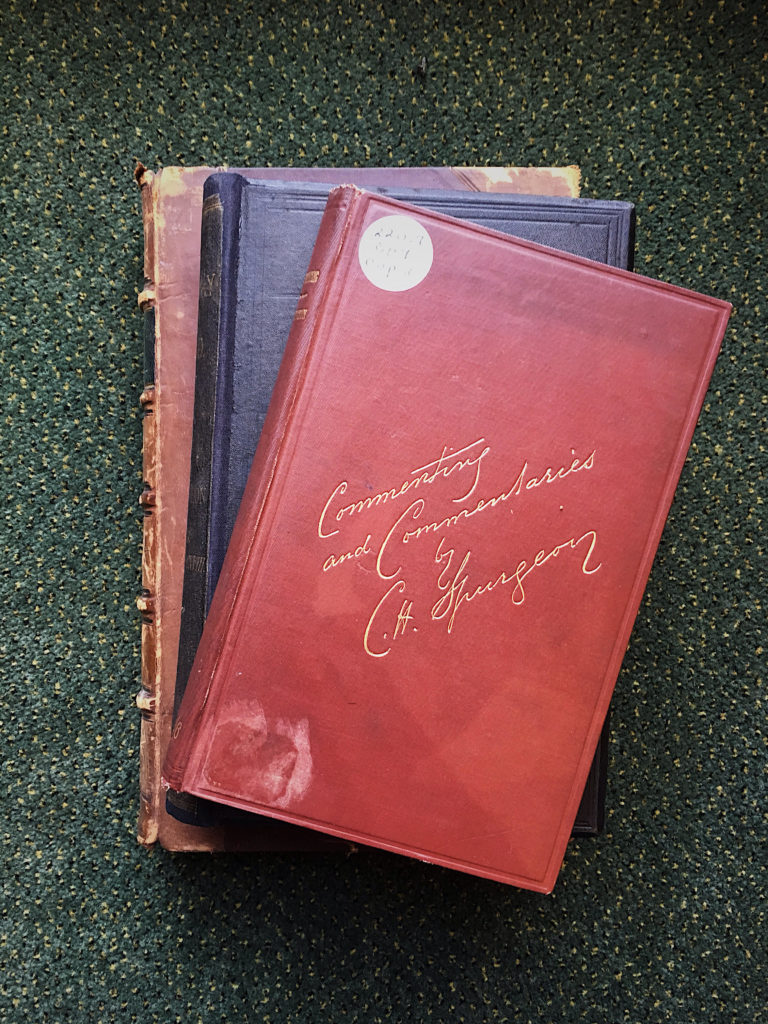
Some tools are so common and useful that they need neither advertisement nor defense. For personal Bible study and sermon preparation, commentaries are invaluable tools, helping the hungry student or pastor to decipher textual background and meaning. Yet, these tools are sometimes forgotten, ignored, or even demeaned.
Charles Haddon Spurgeon consulted commentaries in his own sermon preparation. He thought enough of their usefulness that he read over three thousand volumes in an effort to compile a catalog to guide “ministers of average attainments”. He lauded commentaries not as “a substitute for our own meditations, but as water poured down a dry pump” to stimulate and assist our work.
Published in 1876, his helpful volume Commenting and Commentaries contains three reasons students of the Bible should learn from the work of others.
1. Use commentaries to benefit from other Spirit-gifted teachers.
In Spurgeon’s day, some voices spoke out against using commentaries. Exposing their arrogance, he wrote, “It seems odd, that certain men who talk so much of what the Holy Spirit reveals to themselves, should think so little of what he has revealed to others”. Rather than ignoring commentaries, we should consider the labors of scholars who have already plowed “in the field of exposition”. A number of the commentators endorsed by Spurgeon, such as Matthew Henry and John Gill, still bear the fruit in helping readers understand the Scriptures. When we consult good commentaries alongside our own prayerful study of the text, we exercise humility and enjoy the benefit of what the Spirit of God has taught others.
2. Use commentaries to avoid novelty and error.
Proud neglect of other teachers may lead into dangerous paths of originality and misunderstanding. Spurgeon warned of the tendency toward “empty pretensions to novelty of sentiment” and “wild interpretations and outrageous inferences”. Studying the Bible apart from any other helps may lead to an explanation of the text that is out of harmony with “the faith which was once delivered to the saints”. Although fallible, quality commentaries provide checks and balances against the witness of faithful interpreters of the past.
3. Use commentaries to discover a treasure of real learning.
For the usual despiser of commentaries, Spurgeon said, “in their case, it is the opposite of familiarity which has bred contempt”. While some commentaries “are hardly worth shelf room,” those of excellent quality contain veins of precious ore. Spurgeon’s burden was to help readers quickly get to the gold.
Spurgeon’s list in Commenting and Commentaries is marked by a selective and practical approach as well as by his humor and candor. To help preachers study the text, he omits extremely rare or worthless finds and excludes authors known for unbelief or false doctrine. To catch the reader’s eye, he highlights the “books most heartily recommended” with the largest type. Books of average usefulness appeared in medium-sized print and the “least desirable in the smallest letter”.
In these selections from Spurgeon’s list of expositions of the Psalms, see if you can suppress a smile when reading his witty warnings. Note also his humility concerning his own commenting labors and his gushing recommendation of the treasures he discovered in others labors.
- 383. [J. A. Alexander] Occupies a first place among expositions. It is a clear and judicious explanation of the text, and cannot be dispensed with.
- 397. Calvin is a tree whose “leaf also shall not wither”; whatever he has written lives on, and is never out of date, because he expounded the word without bias or partiality.
- 455. For reading at family prayers. Alas, poor families! Ye have need of patience.
- 473. The author was Wake, but not awake, or he would never have wasted so much paper.
- 467. We hope they benefited the printer; they will not help the reader much.
- 468. [His own Treasury of David, which had only four of six volumes published at that time] Reviewers have handled this book with remarkable kindness, and the public have endorsed their judgment by largely purchasing the volumes already issued. It would not become us to say more.
- 488 Luther needs no trumpeter.
- 536 Sibbes never wastes the student’s time; he scatters pearls and diamonds with both hands.
Study with the Learned
The preacher who wants to learn well will study with the learned. Spurgeon asked, “Who can pretend to biblical learning who has not made himself familiar with the great writers who spent a life in explaining some one sacred book?”.
Quality commentaries are tools of help, protection, and education for the reader who seeks to understand and delight in the Word of God. Spurgeon taught us that nothing can substitute for one’s direct reading and study of the biblical text, but he did not forget or ignore the help of good tools. Let us follow his example.
Doug Smith is a current Th.M. student and a graduate of Midwestern Baptist Theological Seminary. He teaches at Cornerstone Christian Academy (Abingdon, VA), and Graham Bible College (Bristol, TN). He and his wife Krystal are members of Fellowship Chapel in Bristol, Virginia, and are blessed with five children.